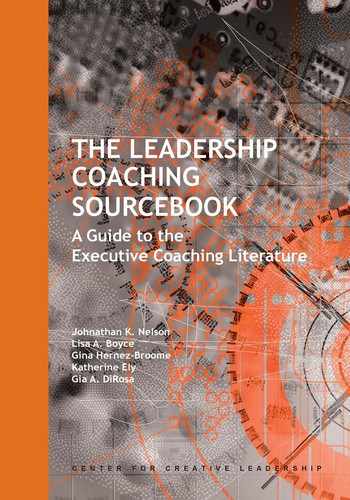The Leadership Coaching Sourcebook presents the most current and solid research on executive coaching. The articles represent a multitude of ideas and perspectives regarding the factors and specific variables critical to coaching, which may be a reflection of the complexity and individualistic nature of coaching engagements. Further, despite the relatively narrow time band, with most articles published in the past decade, the evolution of the field is evident in terms of theoretical discussions and empirical research.
Consistent with this growth is the constant request for more empirical research in almost every aspect of the field, from the most fundamental level of developing a common definition of coaching to research that explores virtual coaching. This message is also reflected in the nature of the articles included in this sourcebook. Despite our efforts to seek out empirically based research, most of the articles presented are theoretical in nature or are based on the experience of the respective authors.
The good news is that although limited, the existing empirical research affirms the effectiveness and value of executive coaching (Dagley, 2006; Kampa-Kokesch & Anderson, 2001; Passmore & Gibbes, 2007). Furthermore, research is becoming more systematic and is identifying and investigating the specific inputs, processes, and outcomes associated with executive coaching (Joo, 2005; Passmore & Gibbes, 2007; Ting & Hart, 2003). In addition, with regard to the evaluation of coaching, more rigorous studies are being conducted, adopting experimental designs that examine client changes from pre- to post-coaching and/or comparing outcomes against a control condition (for example, Evers et al., 2006; Smither et al., 2003).
Although the quantity and quality of research on coaching is improving, much work remains to be done. However, we are confident that as researchers and practitioners alike begin to think about coaching in a more systematic manner, the rigor of the research will improve and many of the current gaps in our knowledge will be addressed. This sourcebook provides a strong contribution to move us in that direction. The intent of the sourcebook is to organize the most current coaching literature cohesively and systematically and in doing so to provide a bearing for the current state of coaching research, including where there is a concentration of effort and where gaps exist. We acknowledge that the literature represented in this sourcebook is not exhaustive. As noted previously, our intent was to keep the sourcebook manageable, so we focused our selection of publications for each section. Thus it is possible that worthwhile publications on executive coaching have not been included, but we believe we have represented the limited empirical research. We encourage practitioners and researchers alike to incorporate the best available knowledge from research, theory, and practice with their expertise to inform the practice of coaching, and hope that informed practice will in turn generate and stimulate excitement for more opportunities to conduct rigorous empirical research.
